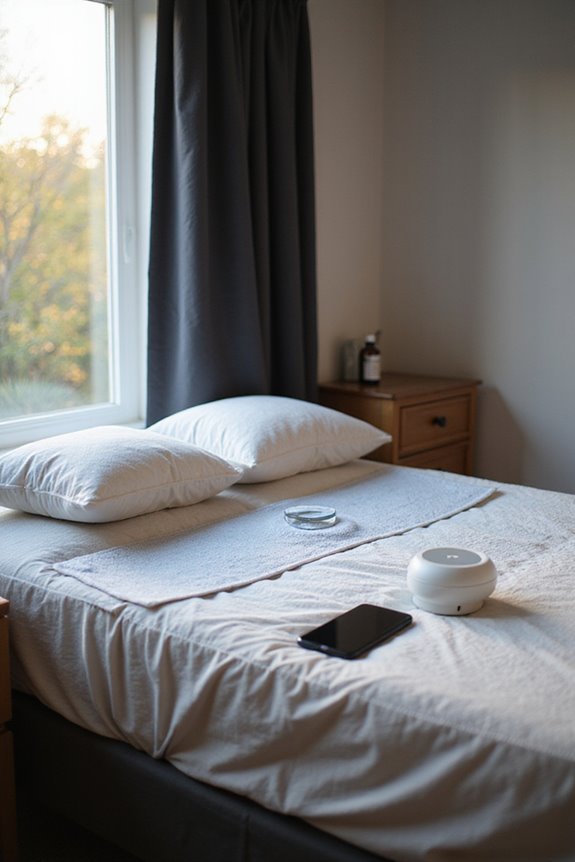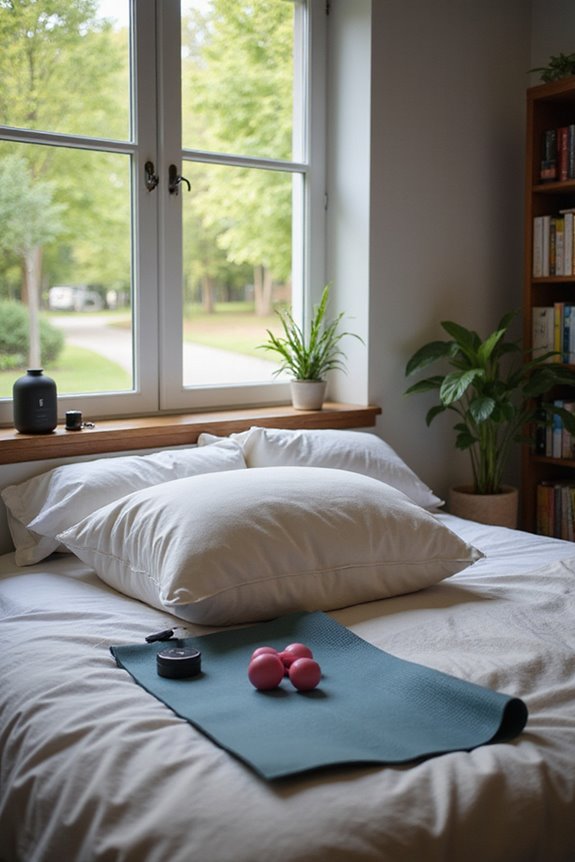Maintaining proper sleep habits is essential for chronic pain prevention. Key strategies include achieving approximately 7 hours of sleep per night to minimize pain sensitivity. Sleep fragmentation can exacerbate pain, while improving sleep quality buffers emotional distress. Effective sleep hygiene practices involve creating a calming bedtime routine, avoiding stimulants before bed, and managing anxiety. By implementing these habits, individuals may experience improved pain management outcomes. Further insights on optimizing sleep and pain interactions can be beneficial.
Key Takeaways
- Aim for approximately 7 hours of sleep per night to minimize the risk of chronic pain and enhance pain tolerance.
- Establish a consistent sleep schedule and calming bedtime routine to stabilize circadian rhythms and improve sleep quality.
- Create an optimal sleep environment by keeping the bedroom cool, dark, and quiet, reserving it for sleep and intimacy only.
- Avoid stimulants like caffeine and alcohol, as well as heavy meals, at least four hours before bedtime to promote better sleep.
- Consider Cognitive Behavioral Therapy for Insomnia (CBT-I) to improve sleep quality and reduce pain interference linked to chronic pain conditions.
Understanding the Link Between Sleep and Pain Sensitivity
Understanding the link between sleep and pain sensitivity raises critical questions about the underlying mechanisms at play.
- Sleep fragmentation greatly impacts pain modulation, leading to increased pain sensitivity.
- Up to 88% of individuals with chronic pain report experiencing sleep problems.
- Disturbances in sleep, even without total deprivation, enhance sensitivity to pain.
- Fragmented sleep disrupts restorative processes, exacerbating pain perception through altered nociceptive pathways.
- Impairments in conditioned pain modulation can occur due to sleep loss, reducing the body’s ability to inhibit pain signals.
- Neuroinflammatory and neurotransmitter changes may mediate the heightened pain response linked to disrupted sleep patterns.
Importance of Sleep Duration for Pain Management

The relationship between sleep duration and chronic pain management is significant, particularly for individuals suffering from chronic musculoskeletal pain. Research indicates that the ideal sleep duration for minimizing chronic musculoskeletal pain is approximately 7 hours per night.
- Sleep durations less than 7 hours correlate with increased odds of pain.
- Conversely, sleeping more than 7 hours can also elevate the risk of chronic pain.
- An odds ratio of 0.772 for chronic pain is observed at the 7-hour mark, underscoring its importance.
Adequate sleep duration not only reduces pain severity but also enhances pain tolerance. Chronic sleep deprivation exacerbates pain sensitivity, highlighting the necessity of maintaining ideal sleep duration for effective pain management. Monitoring sleep habits is essential for individuals seeking to alleviate chronic pain symptoms.
Enhancing Sleep Quality to Reduce Chronic Pain

Improving sleep quality has been shown to greatly impact pain reduction. Key findings include:
- Better sleep acts as a buffer, mitigating the effects of pain interference on depression in chronic pain sufferers.
- Poor sleep exacerbates pain interference, heightening emotional distress and functional impairment.
- Studies indicate that sleep disturbances contribute to pain hypersensitivity, affecting pain perception negatively.
- Cognitive Behavioral Therapy for Insomnia (CBT-I) effectively enhances sleep quality, resulting in moderate improvements in pain interference.
- Enhanced sleep facilitates body repair, reduces pain sensitization, and promotes better emotional regulation. Additionally, using tools such as heating pads for back pain relief can provide immediate comfort, complementing the benefits of improved sleep quality.
Effective Sleep Hygiene Practices

Effective sleep hygiene practices are essential for individuals seeking to improve their sleep quality and, consequently, mitigate chronic pain.
Consistent Sleep Schedule
- Wake up and go to bed at the same time daily to stabilize circadian rhythms.
- Develop a 30-minute bedtime routine with calming activities.
Sleep Environment
- Reserve the bedroom solely for sleep and intimacy.
- Maintain a cool, dark, and quiet environment to enhance sleep cues.
Avoid Stimulants and Heavy Meals
– Refrain from caffeine, alcohol, and heavy meals four hours before bedtime.
Nighttime Wind-Down
– Engage in soothing activities such as gentle reading or relaxation techniques before bed.
Manage Sleep Anxiety
– If awake, perform calming activities outside of bed rather than worrying.
The Role of Daytime Activity in Sleep Improvement

Daytime activity considerably influences sleep quality, providing a range of benefits that extend beyond immediate physical health. Research indicates that higher levels of daytime physical activity correlate with improved sleep quality, creating a positive feedback loop where better sleep enhances daily energy levels.
Key findings include:
- Moderate to vigorous activity reduces sleep disturbances and enhances overall sleep quality in both children and adults.
- Increased energy expenditure during the day establishes a greater need for recovery during sleep.
- Regular physical activity stabilizes circadian rhythms, reinforcing healthy sleep-wake patterns.
- Studies show structured physical activity significantly improves sleep quality across diverse age groups.
Incorporating consistent daytime activity may therefore serve as a practical strategy to enhance sleep health and overall well-being.
Medications and Their Impact on Sleep and Pain Relief
Medications play a significant role in managing chronic pain; however, they can also have profound effects on sleep quality.
- Analgesic Effects: Many analgesics, including opioids and non-opioid medications, alter sleep architecture, impacting overall sleep quality.
- Sleep Fragmentation: Certain analgesics can increase sleep fragmentation, reducing restorative sleep phases essential for pain modulation.
- Medication Timing: Adjusting medication timing may mitigate negative effects on sleep, enhancing overall sleep quality.
- Sleep-Promoting Agents: Combining sleep-promoting medications with analgesics may provide modest pain relief, although evidence remains inconsistent.
Non-Pharmacological Approaches to Optimize Sleep and Pain Outcomes
Non-pharmacological approaches to optimizing sleep and pain outcomes have gained recognition as effective alternatives or complements to medication-based treatments.
Cognitive Behavioral Therapy for Insomnia (CBT-I)
- Proven effective for chronic pain, showing a standardized mean difference of -1.23 for improved sleep quality.
- Reduces pain, anxiety, and depression post-treatment; ideal as a first-line therapy.
Sleep Hygiene Practices
- Essential measures include maintaining a regular schedule and creating a conducive environment.
- Behavioral consistency enhances sleep initiation and quality.
Mind-Body Techniques
- Techniques like progressive muscle relaxation and mindfulness reduce anxiety and improve sleep.
- Combining these with CBT-I forms multicomponent interventions, yielding superior outcomes compared to single-method strategies.
Integrating these approaches addresses diverse factors affecting sleep, leading to enhanced overall well-being.
Frequently Asked Questions
Can Napping During the Day Affect Nighttime Sleep Quality?
Can daytime naps truly impact nighttime sleep quality? Research suggests they can, especially if poorly timed. Disrupting natural sleep cycles with long or late naps may lead to fragmented nighttime rest for many individuals.
How Does Stress Influence Sleep and Chronic Pain?
Stress markedly affects sleep quality and chronic pain. Effective stress management techniques can enhance sleep, subsequently improving pain perception. A holistic approach addressing both stress and sleep is essential for fostering overall well-being and reducing pain experiences.
What Is the Ideal Sleep Environment for Pain Relief?
In a serene retreat, the perfect sleep environment emerges. Ideal sleep temperature and supportive bedding materials create harmony, allowing the body to rejuvenate. This tranquil atmosphere fosters deep rest, ultimately alleviating discomfort and enhancing well-being.
Are There Specific Foods That Promote Better Sleep?
Research indicates that sleep-promoting foods, such as tart cherries, kiwi, and oily fish, enhance sleep quality. Nutrition’s impact on sleep involves balancing nutrients, which fosters a supportive community for individuals seeking restorative rest and overall well-being.
How Can Mindfulness Techniques Improve Sleep and Reduce Pain?
Mindfulness meditation, including techniques like body scan, fosters relaxation and awareness. This practice alleviates anxiety, enhances sleep quality, and reduces pain perception, creating a supportive environment that nurtures both physical and emotional well-being for individuals.




